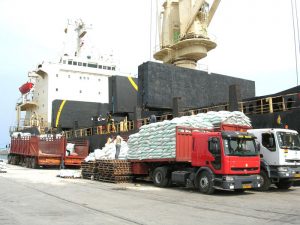The Minerals Commission has set out to reduce Ghana’s export of raw gold in favour of the refined form to increase the country’s revenue from gold.
The commission is, therefore, working on a policy to improve and add value to gold produced in the country to improve Ghana’s receipts from the area.
The policy is to ensure a constant flow of gold products from the country, and to also address the concerns with standards, product certification, hallmarking and capacity development along the value chain.
Currently, a multi-stakeholder steering committee is finalising a draft framework which is expected to be submitted to the Ministry of Lands and Natural Resources before the end of the year.
In 2018, for instances, a total 4,944,069.46 ounces of gold was produced in the country but almost all of it was exported in its raw state.
The Board Chairman of the Minerals Commission, Rev. Sampson Kwaku Boafo, made this known in a speech read on his behalf by a board member of the commission, Torgbui Awusu, at the launch of the project, dubbed “Gold Statement” in Accra last Thursday [August 29, 2019].
The Gold Statement project seeks to re-energise the jewellery sector to promote made-in-Ghana jewels in and outside the country to yield wealth in the sector.
Rev. Boafo lamented how virtually all gold produced in the country was exported in their raw form to overseas refineries, with the country not benefiting fully from it.
He expressed regret that in the absence of viable gold refineries in the country, almost all the gold produced went out of the country in the raw state.
He revealed that although the government granted license to about 13 companies to establish gold refineries in Ghana, most of these companies were no longer in operation, mainly as a result of lack of supply of raw gold to feed the refinery or as a result of their inability to link up with further downstream industries.
Currently, only Gold Coast Refinery Limited is operating as a gold refinery in Ghana.
Efforts by govt
Mr Boafo acknowledged that the local gold jewellery producers who were manufacturing gold products had limited access to gold from mining companies to do their business.
He, however, said the framework, among other initiatives, was expected to address the challenges in the local jewellery industry.
He further noted that the government — based on the recommendations of the commission — had included a clause in the issuance of license that required gold buyers to supply a percentage of gold purchased from small scale miners to local refineries.
The President of the Jewellers Association of Ghana, Mr Jonathan Ababio, said jewellers in the country had to deal with high prices of raw materials on the local market due to competition from speculative buyers on the local market.
He said because gold in Ghana had global appeal and international repute, investors came in with the aim to purchase gold to ship out.
“This, in turn, puts pressure on the jeweller to buy at these higher price rates. Thus, when comparison is being made in the sub region, the prices of finished pieces in Ghana tend to be seen as expensive,” he stated.
in spite of the challenges, he underscored the need for industry players to rise to the occasion and find innovative ways of building the local jewellery industry.
Objective of the project
The Coordinator of the Gold Statement project, Mr Yaw Dua Osei, said Ghana had a marketable jewellery that was unique and could be branded distinctly on the world market if proper quality control was observed.
He said it was against that background that the project sought to complement the government’s efforts create a platform to bring jewellers together, provide a sustainable intervention and projects to keep the sector abreast with new trends through networks and progressive interactions.
Source: Graphic.com.gh






